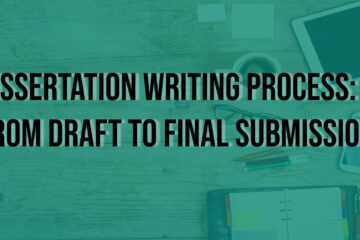Writing a dissertation is a big milestone in every student’s academic journey. Whether you’re in your final year of undergraduate study or completing a Master’s or PhD program, your dissertation paper is often the most important project you’ll work on.
It’s natural to feel a little overwhelmed when you hear the word “dissertation.” After all, it’s a long, detailed, and serious piece of writing. But the good news is, with the right approach and a bit of planning, you can handle it confidently.
In this blog, we’ll break down everything you need to know about writing a dissertation—step by step.
What is a Dissertation?
A dissertation is a long academic paper based on original research. It allows students to explore a topic in depth, present their findings, and contribute to the existing knowledge in their field.
Unlike regular essays or assignments, a dissertation requires you to:
- Choose a unique research topic
- Collect and analyse data
- Show critical thinking and original ideas
- Follow a formal structure
It’s not just about writing; it’s about planning, researching, organising, and presenting information clearly.
Steps to Write a Dissertation Paper
Let’s look at the process in a simple, easy-to-follow way:
1. Choose a Topic That Interests You
Your dissertation journey starts with picking the right topic. Since you’ll be working on it for months, make sure it’s something you genuinely find interesting.
Also, make sure the topic:
- Is related to your course
- Has enough research material available
- Can contribute something new to the field
Tip: Talk to your supervisor to finalise your topic. Their feedback is super valuable.
2. Create a Strong Proposal
Before you start writing the actual dissertation, you need to submit a research proposal. A dissertation proposal is like a roadmap. It outlines:
- What you want to study
- Why the topic is important
- How you plan to do the research
Most universities won’t let you move forward without an approved proposal. So, invest good time and effort into it.
3. Plan Your Work
Dissertations are not something you can finish overnight. Planning is key.
Create a timeline for:
- Research
- Writing different chapters
- Editing and proofreading
- Submitting the final paper
Stick to your schedule as much as possible to avoid last-minute panic.
4. Conduct Research Thoroughly
Research is the heart of a dissertation. Depending on your field, your research may involve:
- Reading books, journals, and articles
- Surveys and questionnaires
- Interviews
- Lab experiments
- Case studies
Make sure you collect credible and relevant data. Always note down your sources—you’ll need them for referencing later.
5. Structure Your Dissertation Properly
Most dissertations follow a standard structure. Here’s a basic outline:
- Title Page: Includes your dissertation title, name, course, and date.
- Abstract: A short summary of your research.
- Acknowledgements: Thank people who helped you.
- Table of Contents: List of chapters and page numbers.
- Introduction: Explain your research question and why it’s important.
- Literature Review: Review previous studies and identify gaps.
- Methodology: Describe how you carried out your research.
- Results: Present the findings of your study.
- Discussion: Interpret your results and link them back to your research question.
- Conclusion: Summarise the main points and suggest future research.
- References/Bibliography: List all sources used.
- Appendices: Any extra material like questionnaires, raw data, etc.
Following a clear structure will make your dissertation much easier to read and understand.
6. Write in Clear, Formal English
Academic writing doesn’t mean complicated writing. Your language should be:
- Formal but not overly complex
- Clear and logical
- Free from grammar and spelling mistakes
Always define key terms, avoid slang, and support your arguments with evidence.
7. Stay Original and Avoid Plagiarism
Plagiarism is a serious academic offence. Always:
- Cite your sources properly
- Use quotation marks when copying exact words
- Paraphrase carefully
If you’re not sure about your referencing style (APA, Harvard, MLA, etc.), ask your supervisor or check your university guidelines.
8. Edit and Proofread Carefully
Once you finish writing, take a break before you start editing. Fresh eyes will catch mistakes better.
While editing, check:
- Grammar, punctuation, and spelling
- Flow between paragraphs and chapters
- Consistency in formatting and referencing
It’s also a good idea to ask a friend, mentor, or professional editor to review your work.
9. Submit On Time
Never leave submission to the last minute. Allow extra time for:
- Printing and binding (if needed)
- Formatting according to university rules
- Final checks
Submitting your dissertation on time shows professionalism and responsibility.
Common Mistakes to Avoid While Writing a Dissertation
Here are some pitfalls you should watch out for:
- Poor time management
Starting too late or leaving big sections for the last minute. - Choosing a weak topic
A topic with not enough material can lead to problems later. - Ignoring feedback
Always listen to your supervisor’s suggestions. - Weak analysis
Don’t just describe findings—analyse and interpret them. - Bad referencing
Incorrect or missing references can lose you marks.
Final Tips for Writing a Great Dissertation
- Break the work into small sections.
- Write regularly, even if it’s just a little each day.
- Stay organised with notes and references.
- Keep backups of your work (use cloud storage like Google Drive).
- Stay positive—small progress every day adds up!
Remember, writing a dissertation is like running a marathon, not a sprint. Take it one step at a time, and don’t be afraid to ask for help if you need it.
Conclusion
Writing a dissertation paper can feel like a huge task, but it’s also an incredible opportunity to explore a subject you care about deeply. With good planning, steady work, and the right mindset, you can complete it successfully.
Always remember: it’s okay to struggle a bit, and it’s okay to ask for help. Stay focused, stay positive, and believe in yourself.



